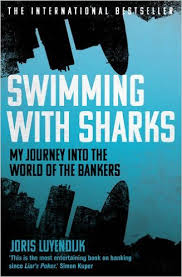Interview with Joris Luyendijk, Author of Swimming with Sharks: My Journey into the World of the Bankers

By: Dr. Kara Tan Bhala
SPI: You interviewed about 200 men and women, all of whom preferred to remain anonymous, in the financial services industry in London. They gave you their stories about the work, people, attitudes and culture of the industry. What is the single most enduring impression you have from these interviews?
JL: That the world of banking is staffed by human beings. It’s easy to think they are monsters on the model of the Wolf of Wall Street or City Boy. I found people remarkably ordinary.
SPI: Based on your interviews, if you had to make an educated guess, what percentage of finance workers in the City care about being ethical and what percentage do not?
JL: I think almost all of them care about ethics in their private lives. But when they step into the bank they leave those personal convictions and beliefs behind. The bank is a-moral, they say, it should make as much profit as possible within the law. The latter is very important, otherwise it would be immoral.
SPI: Are you optimistic about the future of high finance and therefore, about its effects on society?
JL: Not at all. We have a cluster of de facto cartels that divide up the market and use part of their excess profits to maintain their privileges. This system will not change for the better by itself but needs to be forced. But by whom?
SPI: Do you think City and Wall Street finance serves any purpose for society as a whole?
JL: Finance is an honourable activity, I believe. Isn’t it marvellous that we as human beings can agree on a global price for oil, grain or silver? That it is possible for a farmer to be paid a year ahead of the harvest, allowing him to buy seed and fertilizer to make that harvest possible in the first place. I am very happy about the existence of pensions, and I really want bankers to look hard at which wind turbine factory is most efficiently managed.
The problem isn’t finance as such. The problem is with the way finance has grown ridiculously big and is now rife with perverse incentives and conflicts of interest.
SPI: Do you think the culture is pretty much the same on Wall Street? Will you write Swimming with Sharks, Part 2 – My Time on Wall Street?
JL: I could probably do so but that would be bad for my health. One such project is enough.
SPI: Mark Carney, the governor of the Bank of England says there has been an, ‘ethics drift’ in the financial services industry. Will ethics training help to improve behavior in the industry?
JL: Ethics is important but crucial are perverse incentives. If you are rewarded for undesirable behaviour and punished for good behaviour, then you can have all the ethics promises you want but people will act on those temptations.
SPI: There is a lot of talk these days from regulators about changing the culture of the City. What kind of change do you wish to see and how would you go about making the change?
JL: Take on these incentives. Bankers who are in line for a bonus should also be in line for a malus when things go wrong; they should have lots of skin in the game and feel personal liability when things go wrong for them.
SPI: If ethics training and culture change do not help, should we bring back Glass-Steagall in the US and its equivalent in the UK?
JL: Yes, and not only that. There are also huge conflicts of interest between investment banking activities. Then there are the rating agencies, the accountancy firm that also do consultancy work for banks. I can go on. We need a new system.
SPI: What will change?
JL: You need a system of ‘long term greedy’, i.e., people making money with the client, the bank and the economy. Now we have ‘short term greedy’, ie, people making money at the expense of the client etc. So a return to long-termism instead of short-termism, an end to zero job security and zero loyalty, and finance that is relationship based, not transaction based. It’s not rocket science. What is needed is the political will and clout to impose changes on the sector.
SPI: Thank you.
Joris Luyendijk is an author, journalist and talk show host. He was a news correspondent in the Middle East for a number of years. He is the author of People Like Us, which tells the story of his five years in the Middle East. From 2011, Luyendijk was based in London where he worked for The Guardian. In the Joris Luyendijk banking blog he provided an anthropological perspective on the financial world. In Dutch newspapers NRC Handelsblad and De Standaard, Luyendijk commented weekly on his life in the City.

